For many dog lovers, the joy of companionship comes with a practical concern: shedding. Not everyone enjoys the constant battle against dog hair on furniture, clothes, and floors. If you’re dreaming of a furry friend who offers affection without the pervasive tumbleweeds of hair, you’re in luck. There’s a wonderful world of small low maintenance dogs that don’t shed or shed minimally, making them ideal companions for busy individuals, apartment dwellers, or those with allergies. These breeds often come with additional “low maintenance” traits, like moderate exercise needs or a generally calm demeanor, simplifying daily care. Finding the right breed means understanding their unique needs beyond just shedding. We’ve compiled a list of fantastic non-shedding and low-shedding small breeds, offering insights into their temperament, grooming requirements, and overall suitability for a low-fuss lifestyle, helping you discover your perfect canine match. To further explore options, consider these [breed of dogs that don’t shed] for a broader perspective.
Understanding “Low Maintenance” Beyond Just Shedding
When searching for a “low maintenance” dog, it’s crucial to look beyond just their shedding habits. While minimal shedding is a significant factor, a truly low-maintenance dog also considers other aspects of care. This often includes:
- Grooming Needs: Even non-shedding breeds require regular grooming to prevent mats and keep their coats healthy. Some may need professional grooming, while others are fine with at-home brushing.
- Exercise Requirements: Dogs with lower energy levels are often considered easier to manage, needing fewer intense walks or extensive playtime, which is ideal for smaller living spaces or less active owners.
- Trainability and Temperament: A dog that’s eager to please and easily trained can significantly reduce behavioral challenges. Calm and adaptable temperaments also contribute to an easier-to-manage pet.
- Health Concerns: While all dogs need veterinary care, some breeds are prone to fewer genetic health issues, potentially leading to fewer vet visits and lower medical costs over their lifetime.
- Vocalization Levels: For apartment living, a dog that barks less can be a huge bonus, contributing to a more peaceful environment for both you and your neighbors.
Balancing these factors will help you find a truly small low maintenance dog that doesn’t shed and perfectly fits your lifestyle.
Affenpinscher
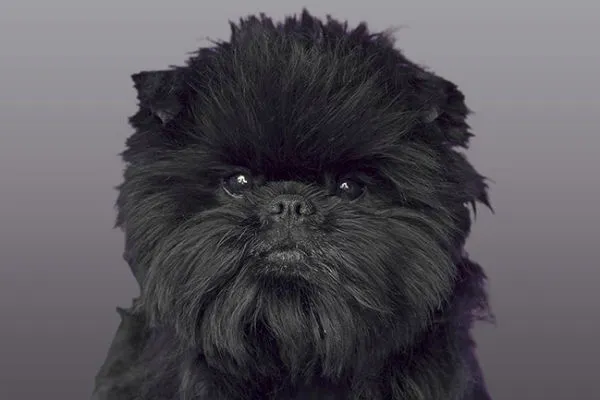 Affenpinscher dog with a playful expression
Affenpinscher dog with a playful expression
The Affenpinscher, whose name charmingly translates to “monkey-like terrier,” lives up to its moniker with an intelligent and mischievous appearance. Despite being a small Toy breed, these dogs are known for their fearless spirit. For owners seeking a dog that won’t leave hair everywhere, the Affenpinscher is an excellent choice. Their wiry coat sheds very little and also boasts a remarkably low “doggy odor,” which is a significant plus for apartment living. A simple twice-weekly brushing with a slicker brush and comb is usually sufficient to maintain their shaggy yet neat look, making their grooming relatively low maintenance. Affenpinschers are also celebrated for their sense of humor and lively personality, adding constant entertainment without excessive shedding or complex care routines.
Basenji
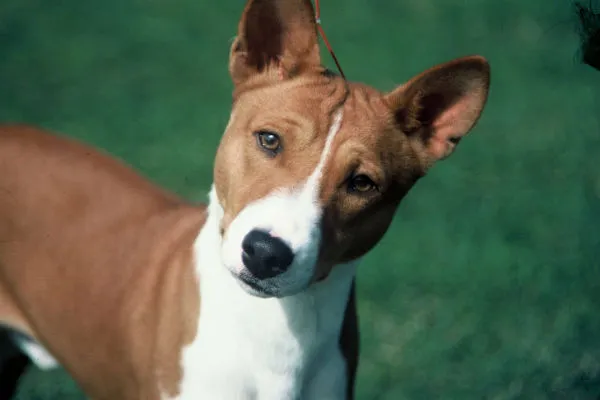 Basenji dog standing alert outdoors
Basenji dog standing alert outdoors
If you’re drawn to hounds but not their characteristic shedding or scent, the Basenji offers a unique solution among small low maintenance dogs that don’t shed. This breed sheds very minimally, and its short, fine coat requires little more than occasional brushing to stay in top condition, making it very easy to care for. Basenjis are famously quiet dogs, known for their “barkless” nature, which makes them highly suitable for apartment living. However, they are energetic hounds and do require daily exercise and mental stimulation to stay happy and prevent boredom. With proper activity, their quiet and clean habits make them a truly low-maintenance addition to many households, especially for those looking for a sophisticated, independent companion.
Bichon Frise
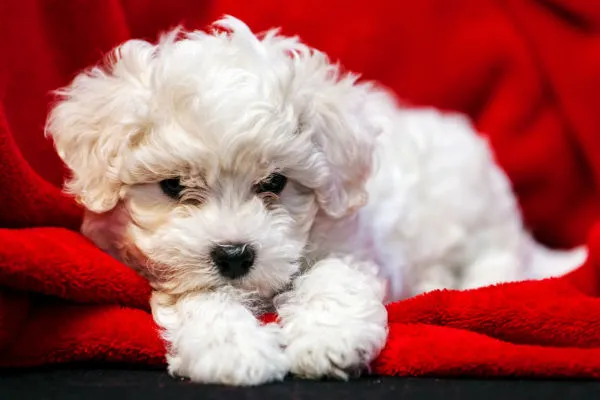 Fluffy white Bichon Frise looking cheerful
Fluffy white Bichon Frise looking cheerful
The Bichon Frise is a prime example of a non-shedding small dog breed, often recommended for individuals with allergies due to their hypoallergenic coats. These playful and affectionate dogs are beloved for their powder-puff appearance and cheerful disposition. While they don’t shed, their continuously growing hair requires consistent attention. Regular grooming, including frequent brushing and professional trims every few weeks, is essential to prevent matting and maintain their iconic fluffy look. Occasional baths also help keep their white coats pristine. Despite the grooming commitment, their minimal shedding, adaptable nature, and joyful presence make them a top choice for those seeking a vibrant companion without the constant cleanup of dog hair.
Bolognese
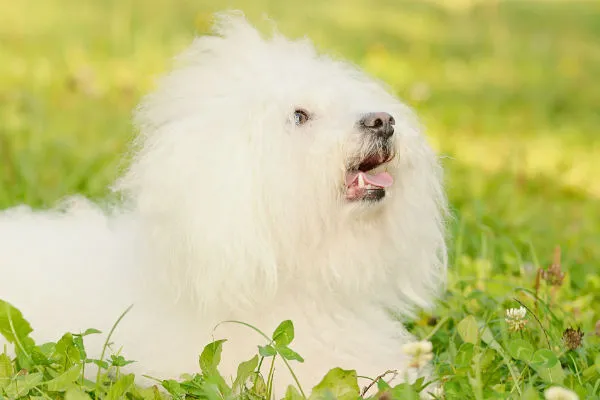 Bolognese dog with a soft white coat
Bolognese dog with a soft white coat
Similar to the Bichon Frise, the Bolognese boasts a distinctive fluffy coat composed of hair rather than fur, making them another excellent choice for those seeking small low maintenance dogs that don’t shed. While Bolognese dogs don’t shed in the traditional sense, their dead hair must be brushed out regularly to prevent tangles and mats. Daily grooming is required to keep their luxurious coats looking their best, a commitment worth noting for potential owners. These lovable lap dogs are known for their calm, devoted, and somewhat reserved nature, thriving on human companionship. Their relatively low exercise needs and quiet demeanor contribute to their low-maintenance appeal, provided their grooming routine is consistently met.
Brussels Griffon
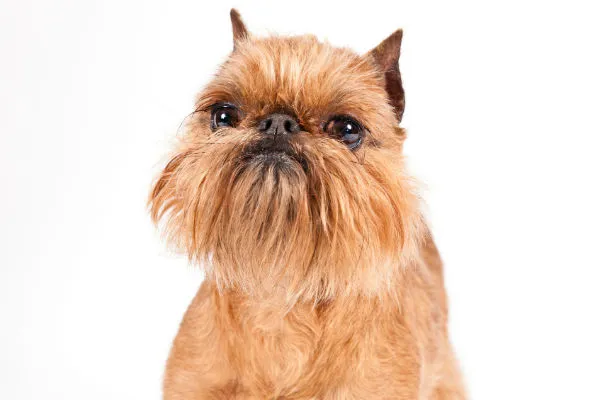 Brussels Griffon with a wiry coat and expressive eyes
Brussels Griffon with a wiry coat and expressive eyes
Despite their diminutive size, Brussels Griffons are not dogs that demand excessive pampering. Available in both smooth-coated and rough-coated varieties, both types are minimal shedders, appealing to those looking for a clean home. The rough-coated Griffons benefit from regular hand-stripping or professional grooming to maintain their texture and reduce shedding even further, while smooth-coated varieties are quite low-maintenance in terms of coat care. Their small stature means their exercise needs are easily met with daily walks and indoor play, making them suitable for various living situations, including apartments. These loyal little dogs thrive in households where they receive plenty of attention and companionship, making them a relatively low maintenance dog that doesn’t shed for attentive owners.
Chinese Crested
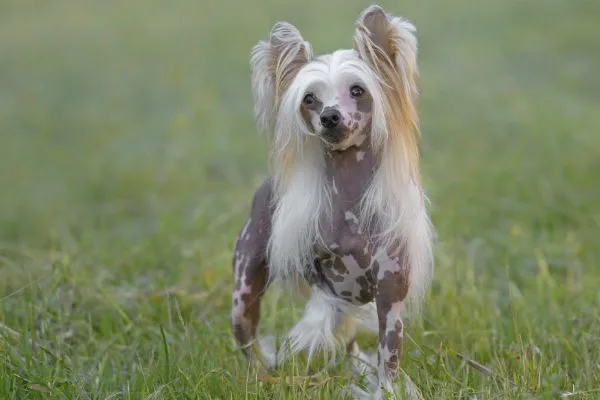 Hairless Chinese Crested dog with hair on its head, tail, and paws
Hairless Chinese Crested dog with hair on its head, tail, and paws
For the ultimate non-shedding experience, the Chinese Crested offers a unique solution. This breed comes in two distinct coat types: the hairless and the powderpuff. Hairless Chinese Crested dogs have hair only on their heads, tails, and feet, virtually eliminating shedding. The powderpuff variety, while covered in a soft, fine coat, sheds very minimally. It’s important to note that hairless breeds require special attention to their skin, needing protection from sun and cold, and being more prone to skin irritations. This skin care routine can be an added “maintenance” factor. Both varieties are affectionate, playful, and thrive on human interaction, offering a spirited companionship for those looking for a truly hair-free home.
Coton De Tulear
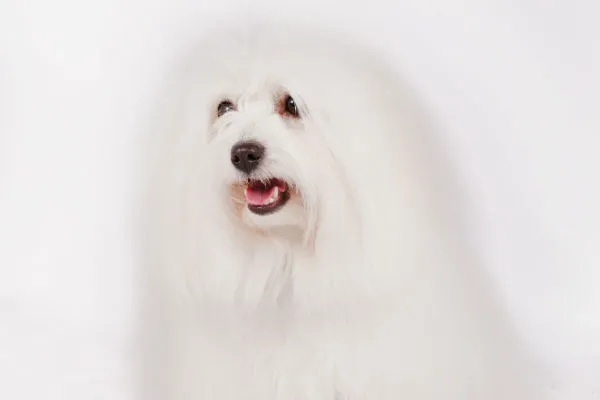 Fluffy white Coton de Tulear with long fur
Fluffy white Coton de Tulear with long fur
The Coton de Tulear, often called the “Royal Dog of Madagascar,” is recognized for its distinctive, long, fluffy coat. This coat is considered hypoallergenic, making the Coton an excellent choice for allergy sufferers and those specifically seeking a small low maintenance dog that doesn’t shed. While their shedding is minimal, their beautiful cotton-like coat does require daily grooming to prevent matting and keep it pristine. The effort invested in their coat care is often rewarded by their cheerful, intelligent, and gentle natures. Coton de Tulears are known for their playful spirit and adaptability, thriving in various living environments as long as they receive consistent companionship and grooming.
Havanese
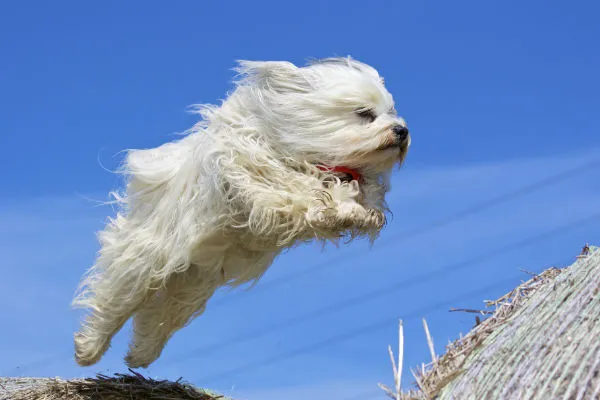 Havanese dog with long, silky fur playing outdoors
Havanese dog with long, silky fur playing outdoors
Hailing from Cuba, the Havanese offers owners a captivating blend of spunky charm and a coat that doesn’t shed, which translates to significantly less time spent lint rolling furniture. This makes them a popular choice among small low maintenance dogs that don’t shed. Their beautiful double coat requires weekly brushing and regular baths to keep it clean, healthy, and free of mats. Havanese are known for their outgoing, playful, and intelligent personalities, making them relatively easy to train and a joy to live with. Their moderate exercise needs can typically be met with daily walks and indoor play, making them well-suited for both apartments and houses.
Maltese
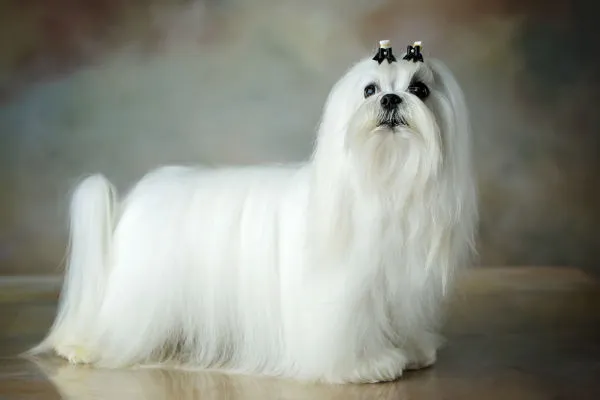 Maltese dog with flowing white hair
Maltese dog with flowing white hair
For three millennia, the Maltese has charmed human companions, and for good reason. This ancient dog of Malta has maintained its popularity, partly due to its long, white coat that sheds very little, making it an ideal lap dog and a perfect candidate for those seeking small low maintenance dogs that don’t shed. Their luxurious silky coats do require regular brushing to prevent mats from forming, and occasional baths are needed to keep their pristine white fur clean. Despite their elegant appearance, Maltese are spirited, playful, and highly adaptable companions. Their small size and moderate exercise requirements contribute to their overall low-maintenance profile, appealing to those who desire an affectionate and regal presence without the constant shedding.
Lhasa Apso
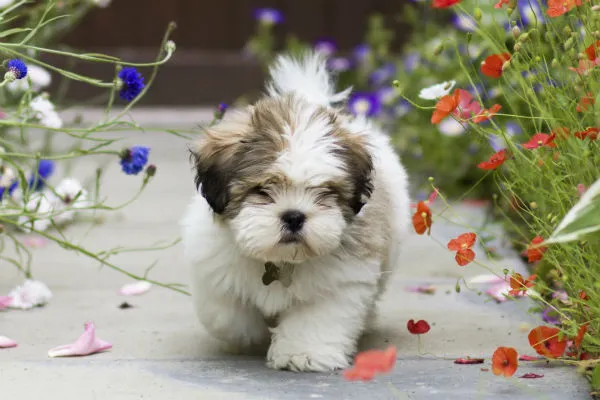 Lhasa Apso with long hair covering its eyes
Lhasa Apso with long hair covering its eyes
Originating from Tibet, the Lhasa Apso is a sturdy and devoted companion. These dogs are calm yet playful, enjoying both brisk walks and peaceful moments resting in their owner’s lap. Lhasa Apsos do not shed, but their long, flowing coats do demand significant maintenance to prevent matting. Many owners opt for a shorter “puppy cut” to simplify daily grooming and brushing, making them more “low maintenance” in terms of coat care. Beyond grooming, their exercise needs are moderate, and they are known for their independent yet loyal nature. With proper training and consistent grooming, a Lhasa Apso can be a wonderful, low-shedding addition to a family. They are also considered among the [healthiest small dog breeds that don’t shed], given their robust nature.
Miniature Schnauzer
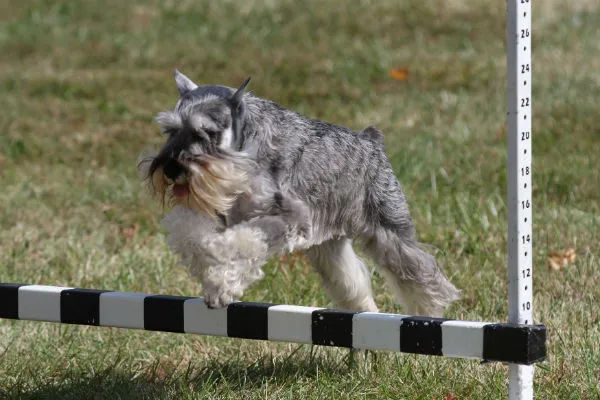 Miniature Schnauzer with its characteristic beard and eyebrows
Miniature Schnauzer with its characteristic beard and eyebrows
The Miniature Schnauzer is a smart, highly trainable, and cheerful terrier that shares a strong resemblance with its larger Standard Schnauzer cousin. This breed sheds very little, making them a favorite among those seeking small low maintenance dogs that don’t shed. Their adaptability allows them to thrive equally well in city apartments or country homes, as long as they are close to their human companions. To keep Miniature Schnauzers looking their best, weekly brushing and regular professional grooming (clipping or hand-stripping) are necessary to maintain their distinctive wiry coat. Their intelligence and eagerness to learn make them relatively easy to train, and their moderate exercise needs contribute to their overall manageable nature.
Poodle
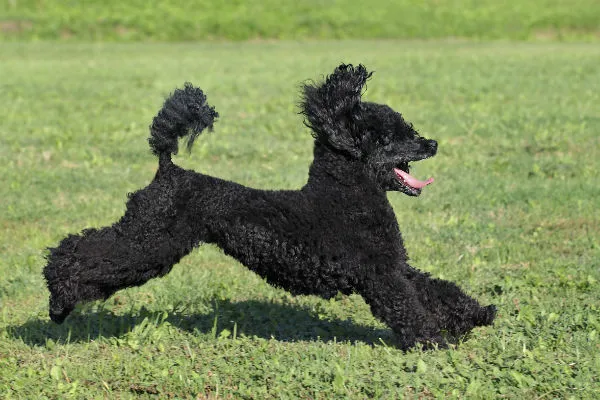 White Poodle with a carefully groomed coat
White Poodle with a carefully groomed coat
When people think of small low maintenance dogs that don’t shed, Poodles often come to mind, and for good reason. Miniature and Toy Poodles are renowned for being non-shedding and hypoallergenic, offering these qualities in intelligent, petite packages. Poodles are highly intelligent and famously easy to train, making them ideal for owners who enjoy engaging with their dogs through training and activities. They are an active and proud breed, requiring regular exercise and mental stimulation. Their signature curly coat does demand consistent professional grooming every 4-6 weeks, along with regular at-home brushing, to prevent matting. Despite the grooming needs, their lack of shedding and high trainability often classify them as a low-maintenance choice for active families.
Scottish Terrier
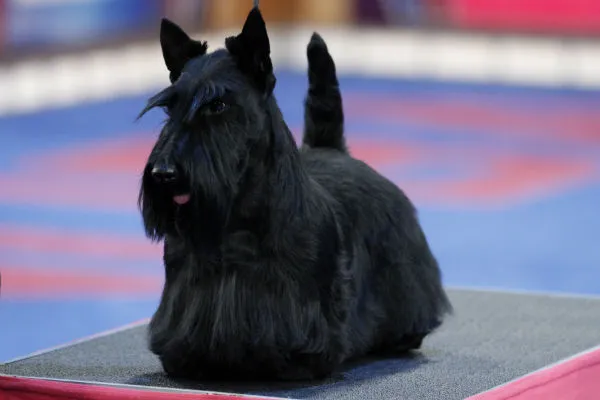 Scottish Terrier with its distinct wiry coat
Scottish Terrier with its distinct wiry coat
The Scottish Terrier, affectionately known as a Scottie, is a terrier breed characterized by its boldness, confidence, and big personality packed into a small frame. Their wiry, weather-resistant double coat sheds very little, making them a desirable option for those avoiding dog hair. While minimal shedding, Scotties do require regular brushing, professional grooming, and occasional hand-stripping to maintain coat health and their distinctive breed outline. These clever and independent dogs possess strong prey drives, which means careful management around smaller animals is necessary. Their moderate exercise needs can be met with daily walks and playtime, and their independent streak can make training a rewarding challenge for first-time owners.
Shih Tzu
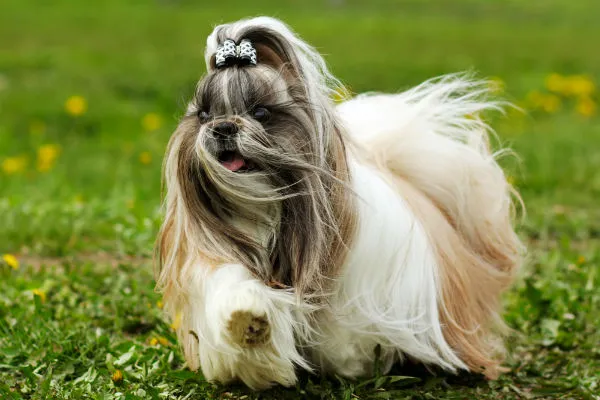 Shih Tzu dog with long, flowing hair and a playful expression
Shih Tzu dog with long, flowing hair and a playful expression
The Shih Tzu, with its long and distinguished pedigree, was once the favored house pet of the Tang Dynasty. These “little lion dogs” come in a variety of beautiful colors and patterns. Their long, silky hair is very low-shedding, looking exceptionally regal when brushed out—a nod to their royal ancestry. This Toy breed is sturdy and lively, often described as having an arrogant carriage due to their proudly held heads and curling tails. Shih Tzus were specifically bred to be house pets, and their gentle, trusting nature makes them exceptional companions. While their long coat requires daily brushing to prevent tangles and mats, their minimal shedding, adaptability, and moderate exercise needs position them as an excellent small low maintenance dog that doesn’t shed.
West Highland White Terrier
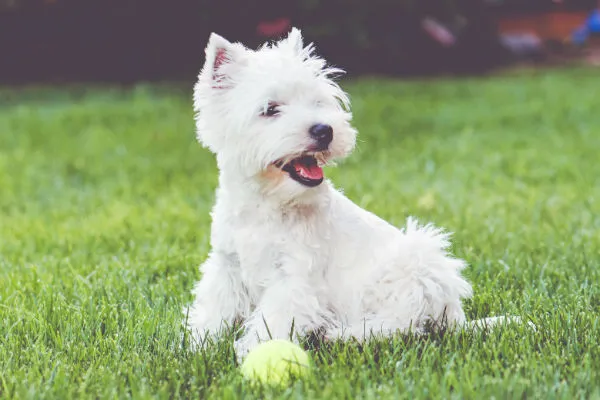 West Highland White Terrier (Westie) sitting alertly
West Highland White Terrier (Westie) sitting alertly
The coarse, white coat of the West Highland White Terrier, fondly called Westies by their admirers, sheds very little, making them an attractive option for neat homes. This sturdy little dog is intelligent, loyal, happy, and incredibly entertaining. Westies are curious dogs with moderate energy levels, enjoying daily walks and playtime. Their independent streak, common among all Terriers, can sometimes make training a bit of a challenge but also adds to their unique character. Regular brushing and professional grooming (stripping or clipping) are necessary to maintain their coat’s texture and cleanliness. For those who appreciate a spirited, low-shedding companion, Westies are a fantastic choice. For more calm options, you might look into [small dogs that don’t shed and are calm].
Xoloitzcuintli
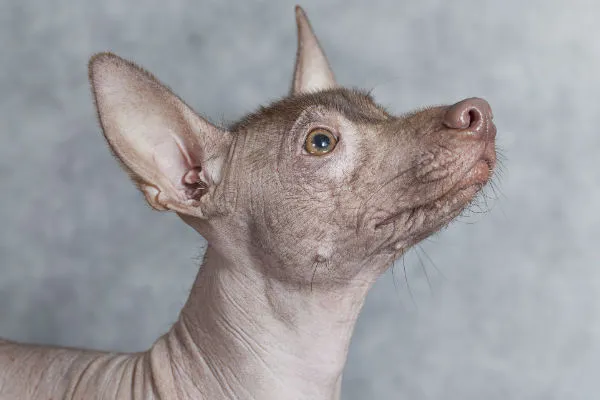 Hairless Xoloitzcuintli dog with sparse hair on its head
Hairless Xoloitzcuintli dog with sparse hair on its head
Also known as the Mexican Hairless, the Xoloitzcuintli is an ancient and rare breed that can be either hairless or coated. The hairless varieties, with only small amounts of hair on their heads, offer virtually no shedding. The coated variety has a very short, fine coat that sheds minimally. As with any hairless breed, the Xolo requires extra attention to their skin, needing protection from the sun, cold, and potential irritations – an important “maintenance” consideration. Xolos are known for being attentive watchdogs and affectionate companions. While they enjoy physical activities like walks and vigorous play, they are also well-regarded for their tranquil personalities at home, making them a uniquely calm and low-shedding choice for the right owner.
Yorkshire Terrier
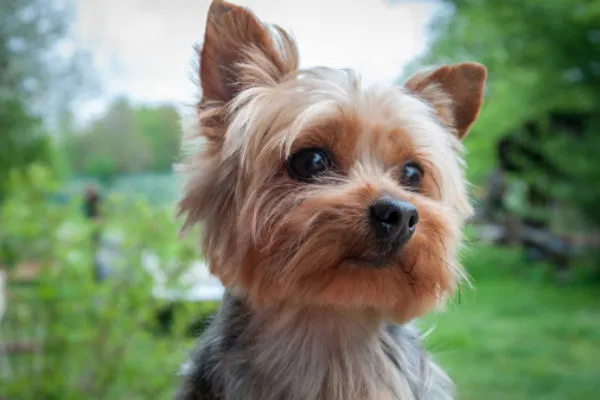 Yorkshire Terrier with silky, long hair tied in a bow
Yorkshire Terrier with silky, long hair tied in a bow
Sprightly, tomboyish, and affectionate, the Yorkshire Terrier, or Yorkie, is a Toy breed brimming with personality. These spunky lap dogs are incredibly popular, and for good reason. Yorkshire Terriers do not shed, and their long, silky coats are stunning when brushed out daily – a task made easy by their small size. Despite their regal appearance, Yorkies have working-class roots, originally hunting rats in English clothing mills. Today, they are just as content to cuddle on a lap as they are to chase a toy. Their minimal shedding and compact size make them an excellent small low maintenance dog that doesn’t shed for many households, although their long coats do require regular grooming to prevent matting. For slightly larger options with similar traits, consider exploring [medium to small dogs that don’t shed].
Other Considerations for Low-Maintenance, Non-Shedding Breeds
While the breeds listed above are fantastic options, the Terrier group in general is a treasure trove of small dogs that shed minimally or not at all. Wiry- and coarse-haired Terriers, like some varieties not individually detailed here (e.g., Border Terrier, Cairn Terrier), typically shed less than many other breeds.
It’s important to remember that “low maintenance” is relative. Even a non-shedding dog requires commitment. Take the time to carefully research any breed that catches your eye, considering not just their shedding habits, but also their grooming needs, exercise requirements, temperament, and potential health issues. A responsible owner understands that choosing a dog is about finding the best match for your lifestyle and personality. Always strive to purchase a dog from a reliable breeder or consider adoption from a reputable rescue organization. Provide your chosen companion with a high-quality diet and ensure they receive regular veterinary checkups to maintain their health and happiness for years to come. Ultimately, the best small low maintenance dog that doesn’t shed is one you are prepared to love and care for completely.
